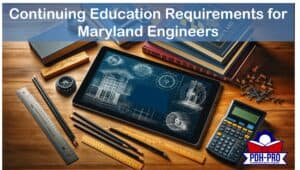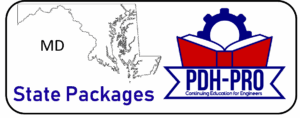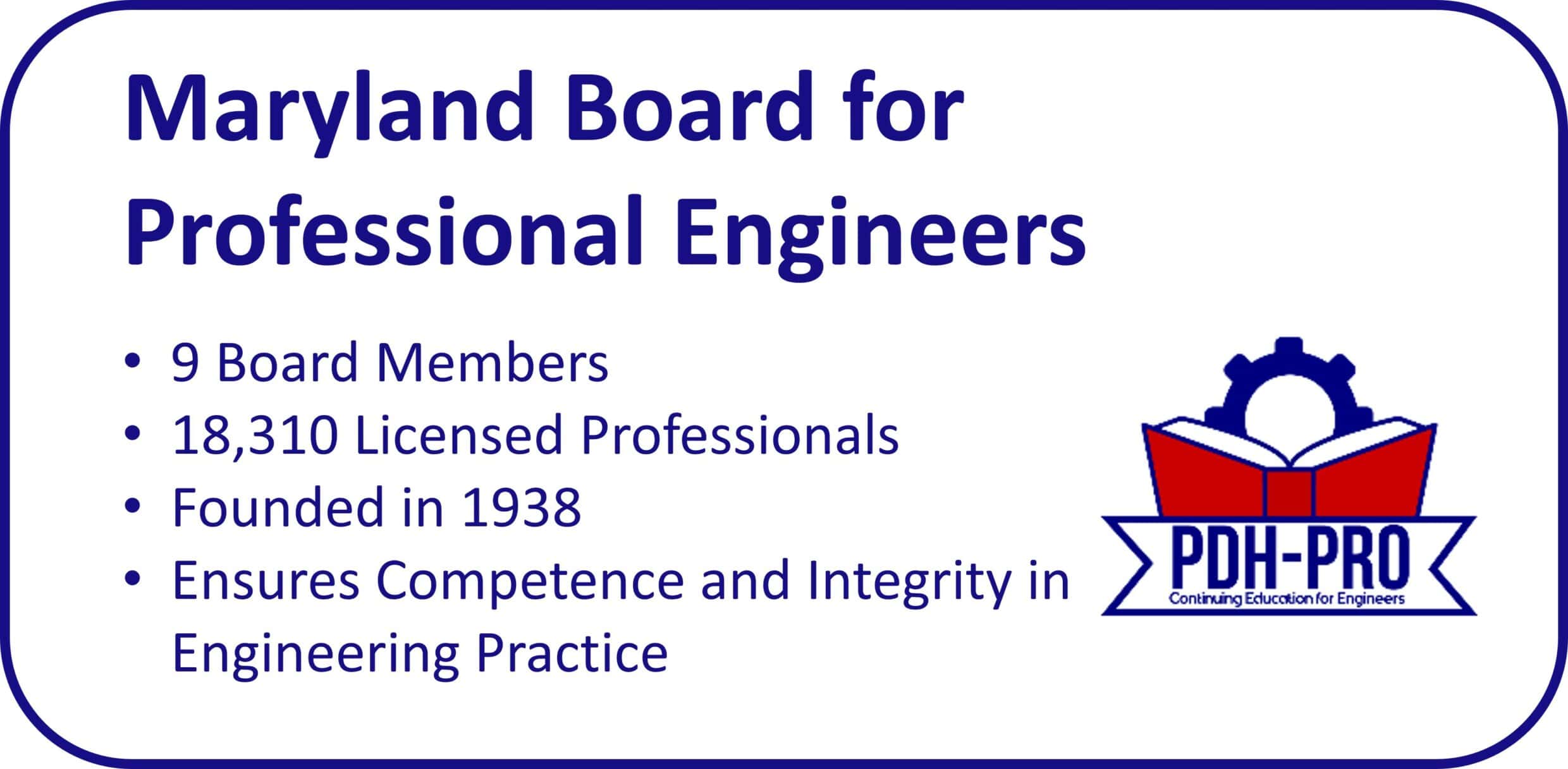CEU Requirements for Maryland Professional Engineers
Professional engineers are expected to continuously update their skills, acquire new expertise and broaden their knowledge base to renew their license. One of the most frequent questions we are asked by Maryland PEs is – What are the continuing education requirement for Maryland professional engineers?
In Maryland, professional engineers are required to complete 16 professional development hours every two years. At least 1 PDH must be from an ethics related topic. The board allows a maximum of 8 hours of credit to be carried forward to the next licensing term. Engineering licenses are renewed every two years on the last day of the month from the date of issue. Maryland pre-approves continuing education providers.
Professional engineers renewing their license for the first time are exempted from having to earn continuing education credits. Licensees must earn all PDH credits during the first renewal cycle. No credits may be applied if they were completed prior to being licensed in Maryland.
PDH-Pro offers packages that allow engineers to earn PDH credits. These packages include all 16 PDH credits and are guaranteed to be accepted by the Maryland board.
For a complete list of all license renewal requirements check out our Maryland PE renewal page.
Maryland PDH Credits
The Maryland Board for Professional Engineers regulates engineering in Maryland.The licensee is required to earn 16 PDH credits every 24 months (biennially). Courses must be completed from qualified programs and must improve the professional competency and foster improvement, enhance and extend the professional skills and knowledge related to the practice of engineering.
Acceptable engineering continuing education courses are:
- Technical, research, analytical, or design aspects of engineering;
- Laws and regulations applicable to the practice of engineering in Maryland;
- Engineering-related computer hardware and software topics;
- Standards of practice or care;
- Professional engineering ethics;
- Project management, risk assessment and management, or emergency and disaster management; or
- Similar topics aimed to maintain, improve, or expand the skills and knowledge relevant to the licensees field of practice.
During each renewal period, at least one of the PDH credits must be related to ethics. The content of the ethics course must meet the Maryland board requirements which are outlined below.
Maryland pre-approves course providers. All continuing education courses must be completed with one of these CPC sponsors. PDH-Pro is an approved Maryland provider of Continuing Professional Competency.
During the renewal cycle, the candidate has to certify that the required number of PDH credits have been completed. This submission can be done online. Submission of certificates is not required during renewal but each engineer must maintain records for at least 4 years after completing the course. Audits are done randomly. If audited, the licensee must provide proof of completion for all hours claimed.
Maryland License Renewal Dates
Maryland engineering licenses are valid for two years. The renewal date for all engineers is the last date of the month for the date of issue of original license.
Generally, renewal notices are sent approximately 60 days before license expiration. Engineers can renew their license 60 days from the date of expiration.
In case the license is not renewed within the stipulated time, it expires. License reinstatement costs an additional $100. The licensee must also submit the proof of completion of the required CPC hours (16 PDH including 1 from ethics) within 30 days of reinstatement.
Engineering Ethics and Professional Conduct
The engineering profession affects affect most aspects of society – technical, economical, environmental or legal. Because of this vital role, it is necessary that engineers not only possess technical expertise but also understand and adhere to the highest ethical standards. To inculcate the code of ethics into the day-to-day working of an engineer, the Maryland board requires each licensee to complete at least one PDH hour in the area ethics.
The ethics course must provide the following benefits:
- Awareness of ethical concerns and conflicts related to the practice of engineering;
- An enhanced familiarity with the code of conduct for professional engineers;
- An understanding of standards of practice or care related to the practice of engineering; or
- Laws and regulations applicable to the practice of engineering in Maryland.
Records Keeping Requirements for Engineers
Each licensee is responsible for maintaining records to document completion of continuing professional competency courses. The Maryland board audits a portion of licensees each year. If audited, the individual engineer must provide the relevant documents to prove that they met the required condition for license renewal.
Record must be maintained for at least four years from the date of completion of the qualifying program. The documents that are suitable for verifying CPC credits are:
- Certificates of participation;
- Transcripts, if appropriate;
- Reprints of publications;
- Proof of presentations;
Each record should include the following information:
- Title and description of the activity;
- Dates and times attended;
- Presenter’s name; and
- Any other information that may be required by the Board.
The National Council of Examiners for Engineering and Surveying (NCEES) has a continuing education records management system that meets the board’s requirements. It is a useful tool for keeping track of courses, but it is not required.
Continuing Education Activities Accepted by the Board
Continuing education activities that are accepted by the board include attending and completing any qualifying courses which improve or expand the skills and knowledge of the licensee’s field of practice. The course should lead to the improvement of skills and should help in acquiring the knowledge related to the practice of engineering. The final decision on whether an activity constitutes as qualifying activity lies with the Board.
Online Courses: Self directed activity or self study activity may include correspondence course, online courses and televised, videotaped or audiotaped presentations. These activities are must have a clear outcome that can be measured in the form of narrative, test, report, study or research paper to be considered as qualifying activity. No limit has been set by the Board on the number of PDH that can be earned by these activities.
Live Webinars: Educational activities such as webinars take the self directed activities one step forward. These courses are interactive and can enhance the reach of the presenter even to the remote corners of the world. If a webinar meets the standards established by the Board, it can be used to meet the required PDH credits.
Other Activities: Other than the activities related to the practice of engineering which are authorized or pre-approved, the following are also suitable for earning credits:
- Being a first author of an original paper on an engineering subject or other similar publication intended for professional use and distribution
- Similarly, being a single or first author of an original published book on engineering
- Obtaining a patent
- Developing examination questions accepted for use in the NCEES examination
- Active participation in an engineering professional or technical society
- Teaching or lecturing as part of a qualified program
The credit earned through these activities allows the licensee to earn varying PDH units. For example, each published book earns 24 PDH, while a research paper earns 5 PDH. Credit of one college semester hour converts to 45 PDHs.
Regular duties performed in the course of employment by the licensee are not considered as qualified activities. The following activities would not be acceptable for meeting the continuing education requirements:
- Regular employment as a professional engineer, full-time faculty member, or expert witness;
- Marketing or business development or sales;
- Equipment demonstrations or trade show displays;
- Time management techniques and strategies;
- Computer-aided drafting;
- Repetitive attendance of the same course or activity;
- Attending committee meetings or general business meetings of any organization;
- Conversational language courses for personal use;
- Executive coaching;
- Basic computer software, including, but not limited to, Excel, Word, Outlook, and similar basic computer software; or
- Any other topics not relevant to the practice of engineering.
Which Continuing Education Activities Count?
In a nutshell, activities related to the field of practice that add to the knowledge and improve the skills of the licensee are suitable.To quality, a training activity should have a stated purpose, well-defined content area, and a clearly stated duration. These activities must also help in improving the professional competency and should not be focused solely on personal use or business skills.
Pre-Approval of Continuing Education Activities
The Maryland board pre-approves course providers. PDH-Pro is an approved Maryland provider of Continuing Professional Competency. Learn more about our approval.
The Board provides a complete list of all the approved course providers for reference.
Sources of Free Continuing Education Courses
In the recent years, the number of online courses has increased exponentially and advances in communication technology have made interactive courses such as live webinars common. Various world class institutions such as MIT, Harvard, Caltech, and Stanford are providing Massive Open Online Courses (MOOCs). These classes are led by subject matter experts and are mostly free of charge.
Professional engineers who are members of professional organizations such as NSPE, ASME, or ASCE can complete courses for free as a benefit of membership.
Maryland Engineering Licensing
To become a professional engineer a candidate has to meet the following educational and/or experience requirements:
Option 1: EAC/ABET Approved Degree
- Educational qualification required- graduation from a 4 year curriculum in engineering or its equivalent that is approved by the board.
- Experience: at least 4 years of experience in engineering
Option 2: Non-EAC/ABET or Foreign Curriculum
- Educational qualification required- Graduation after completion of a 4 year curriculum in engineering or its equivalent, that has not been approved by the board
- Experience: At least 8 years of experience in engineering
Option 3: Work Experience
- 12 years of work experience with at least 5 years of it in which the applicant has been in a responsible charge.
- The applicant may substitute a complete scholastic year of at least 30 credit hours for each of these years of experience, if the grades are satisfactory to the Board.
- If the applicant has completed graduate study from a college/ University recognized by the Board, it may allow up to 1 year credit toward the experience requirement.
- If the college/university is not recognized by the Board, it may allow credit up to six months towards experience required for each of those years.
The application for the exam is filled 120 days prior to the date of exam. The fee to sit for the NCEES exam is $50.
Once the applicant passes the Principles and Practice of Engineering (PE or P&P) examination conducted by NCEES, he/she may apply for license in the state of Maryland. The application may be completed online.
All-In-One Engineering Packages for Maryland
 PDH-Pro offers Maryland Engineering Packages to provide professional engineers with convenient way to earn all of the continuing education requirements established by the Maryland engineering board. We review the Maryland continuing education requirements for engineers every year. Based on this research, we update our CEU packages to make certain they meet the Board’s requirements.
PDH-Pro offers Maryland Engineering Packages to provide professional engineers with convenient way to earn all of the continuing education requirements established by the Maryland engineering board. We review the Maryland continuing education requirements for engineers every year. Based on this research, we update our CEU packages to make certain they meet the Board’s requirements.
Engineering Discipline Restrictions
The Maryland Department of Labor Subtitle 23 Board for Professional Engineers Chapter 06 Continuing Professional Professional Competency Requirements requires that a continuing education course should maintain, improve, or expand the skills and knowledge relevant to the licensee’s field of practice. This means that the course must be relevant to the field of the licensee. In today’s world there is significant overlap between the various engineering disciplines. Thus, due to the multi-discipline nature of most projects, an engineer must be knowledgeable in a wide range of technical areas.
As a result, the Board has not directly restrict doing a course in a field different from the field of engineering degree, care should be taken that such a course satisfies the conditions laid down in the Regulation .04 of the above mentioned chapter i.e. should not be limited to personal use.

